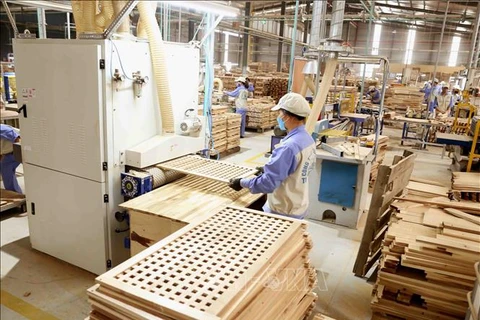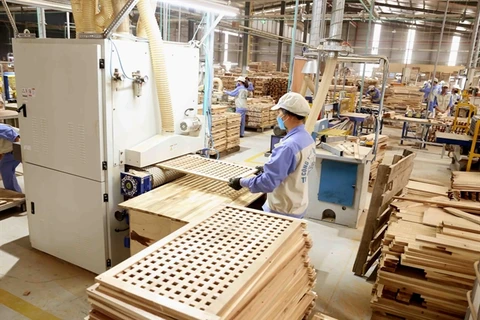Hanoi (VNA) – The year 2024 is forecast to remain a challenging year for wood industry, given several issues affecting the sustainability of production and export, according to experts.
Statistics of the Ministry of Agriculture and Rural Development show that the sector’s export turnover reached 14.39 billion USD last year, down 15.8% year-on-year.
Major export markets have increasingly stricter regulations on product legality and sustainability. Specifically, the EU Deforestation Regulation (EUDR), which took effect in late June 2023, requires products imported into this market to ensure legality and not cause deforestation.
Along with the EU, many other markets have also set new and strict policies, causing many difficulties for wood export activities. The US market requires an increase in the frequency of investigations applying trade remedies to the industry, and also compliance with labour and employment regulations. Japan also requires Vietnamese wood products to have sustainability certificates.
The German Supply Chain Due Diligence Act is also indirectly impacting Vietnamese exporters. German importers require Vietnamese exporters to provide additional certificates related to product origin, employment status, wages, waste treatment and other related certificates.
Meanwhile, Canada currently tends to put forward more environmental regulations in its product design, manufacturing and marketing strategies. Recently, the Canadian Government published a regulatory framework to establish mandatory requirements for recycled content and labelling for plastic products, which will have some impacts on most of Vietnam's export commodity groups, from consumer goods packaging to other key export sectors./.
Statistics of the Ministry of Agriculture and Rural Development show that the sector’s export turnover reached 14.39 billion USD last year, down 15.8% year-on-year.
Major export markets have increasingly stricter regulations on product legality and sustainability. Specifically, the EU Deforestation Regulation (EUDR), which took effect in late June 2023, requires products imported into this market to ensure legality and not cause deforestation.
Along with the EU, many other markets have also set new and strict policies, causing many difficulties for wood export activities. The US market requires an increase in the frequency of investigations applying trade remedies to the industry, and also compliance with labour and employment regulations. Japan also requires Vietnamese wood products to have sustainability certificates.
The German Supply Chain Due Diligence Act is also indirectly impacting Vietnamese exporters. German importers require Vietnamese exporters to provide additional certificates related to product origin, employment status, wages, waste treatment and other related certificates.
Meanwhile, Canada currently tends to put forward more environmental regulations in its product design, manufacturing and marketing strategies. Recently, the Canadian Government published a regulatory framework to establish mandatory requirements for recycled content and labelling for plastic products, which will have some impacts on most of Vietnam's export commodity groups, from consumer goods packaging to other key export sectors./.
VNA
























